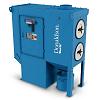- FMA
- The Fabricator
- FABTECH
- Canadian Metalworking
Standardized welding skills - CWB intros Acorn
On May 19th at, CWB Group launched its new Acorn program, aimed at strengthening welding training and assessment throughout the industry, and thereby build a stronger industry.
- May 21, 2015
- News Release
- Welding
Welding plays an important role in many industries, and yet there has not been a standardized education system or assessment process to properly determine the skillset and knowledge of the talent out there. The CWB Group is hoping to change that with its new Acorn program. Acorn aims to provide uniform training and assessment. It is a national training resource for those involved in welding and related occupations training. “The goal with Acorn is to create the foundation on which a national program can be based,” explains Ian Campbell, Director of Marketing and New Product Development at CWB Group. “We have created about 48 courses now. And now that we’ve done that, we want to go to industry and educators and see how we can make this better.” The Acorn program is comprised of vendor-neutral learning material supported by uniform and centrally managed course delivery, skills testing and assessment processes. All the courses will be managed and delivered to schools and industry through the CWB Institute (CWBi). The courses are being made available to high schools and post-secondary institutions. The learning material aims to help industry improve production, implement new technology and processes, increase revenue and employ skilled welding professionals. And with a program called AcornConnect, employers will be able to see which welders who have been through the program match the skill sets that they need.{gallery}4862{/gallery}“As part of our certification duties we see about 70,000 welders a year, so we know that from coast-to-coast the quality of welder education in some areas is really good, and in other areas is not as good,” says Campbell. “So if I’m an employer in BC and I want to hire someone from Halifax, how do I know that he’s a good welder? He may have his ticket, but that isn’t always sufficient to determine if he’s the right person for your shop. The assessments we do for Acorn are live – we are looking at whether you process the job correctly, if you do the work safely, do you work well with others, are you following the right procedures, are you prepping the material correctly? The intent is to create a thorough view of the welder and his work. “In AcornConnect, employers can dial in their ideal welder – which processes they require of a welder, does he work well with others – and the system tries to match hiring requirements with someone in the database.” The Acorn teaching modules are set up with hands-on components, as well as online coursework related to theoretical topics. This way, students can work through the theory portion of the course at their own pace. The students have to show an adequate level of theoretical knowledge before a given set of in-shop exercises can commence. This ensures efficient use of face time training. The CWB is trying to make the course material as interactive and multi-platformed as possible, so that whatever learning style a student has, they will be able to grasp the information. For instance, all printed material is mobile enabled, allowing key static 2D images to be explored in 3D. There is also video and audio commentary, and cross-platform content linking.The CWB also wants to ensure that Acorn is structured in such a way that it meets the needs of welders at every stage of their career. For grade schools, the program is geared for improving trade awareness – introducing students to the welding trade, and helping them decide, through videos and questionnaires, whether welding is something that they would actually like to do every day. At the post-secondary level, it aims to first train welders for the trade in general: welder, fitter, supervisor, inspector and NDE technician basics. The next stage of learning offers industry specialization in – for instance, in structural, pipe or inspection work.“As industry adopts the program, we will work with them to put assessments together in areas that they require,” Campbell explains. “For instance, a shipbuilding company may come to us and say, ‘we need welders with this specific skill set’, and we would develop a program for that area. Then, either someone at the company could teach the course, or we would approach the local college or university to deliver the program for them. At that point, that learning module would be available for any other company to use.” Later still, the program offers skills specialization for process, materials and tasks. As Campbell explains it, Acorn is meant to be a career-long resource, so if someone finds that they suddenly have to weld materials they are unfamiliar with, courses will be available to bridge those knowledge gaps. “There are even programs for shop floor management as well,” says Campbell. “At some point, many of these welders will manage employees and material flow, and they’ve never been trained how to do that. This program can’t just be about training a welder, it’s about how to get them trained to be successful.”What the CWB has created appears to be exactly what they were hoping for – groundwork for an educational system that gives those in the welding trade everything they need to succeed. To learn more, visit cwbgroup.org.
subscribe now


Keep up to date with the latest news, events, and technology for all things metal from our pair of monthly magazines written specifically for Canadian manufacturers!
Start Your Free Subscription- Industry Events
Automate 2024
- May 6 - 9, 2024
- Chicago, IL
ANCA Open House
- May 7 - 8, 2024
- Wixom, MI
17th annual Joint Open House
- May 8 - 9, 2024
- Oakville and Mississauga, ON Canada
MME Saskatoon
- May 28, 2024
- Saskatoon, SK Canada
CME's Health & Safety Symposium for Manufacturers
- May 29, 2024
- Mississauga, ON Canada



















